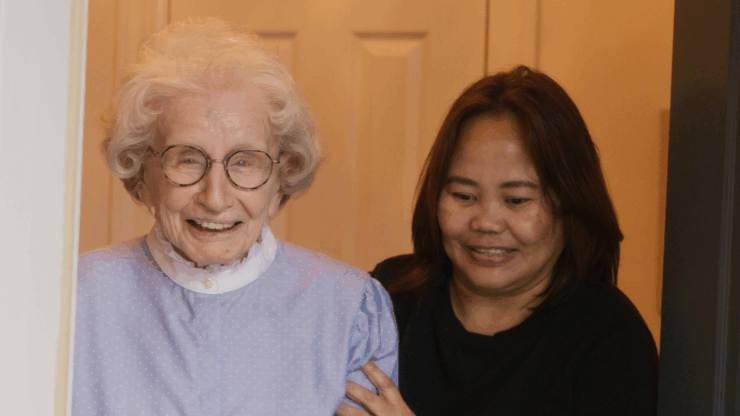
New to Caregiving: 7 Essential Tips You Need to Know
If you’re not a caregiver now, the odds are you may find yourself in the role someday. When a family member or a friend falls ill, enters an advanced age, or gets injured, they may need support and care to maintain quality of life and independence. Caring for another person can be difficult emotionally, physically, and mentally, but it doesn’t have to be.Despite the challenges, caregiving is a rewarding experience, and it requires an enormous commitment of time and energy. As a new caregiver, you may feel overwhelmed with the new role and the caregiving journey. In this article, you will find seven essential tips to help you get started on the right foot.
Do your research and stay organized
A lot of the challenges with in-home care can be avoided by learning as much as you can about the disability or illness your loved one or client is going through. The more knowledgeable you are about your loved one or client’s condition or disability, the more prepared you will be and the less stressful the situation becomes. Be sure to research your loved one’s condition to gain a better understanding of their needs.
Additionally, as a new caregiver, you will find yourself juggling multiple responsibilities and tasks. Start by creating a centralized system to store and organize important documents, such as medical records, insurance information, and contact details for healthcare providers. You may also want to consider using a calendar or planner to keep track of appointments, medication schedules, and other caregiving tasks.
It’s important to maintain open lines of communication with healthcare providers and take notes during appointments and discussions to remember important details or questions you may have. Keeping track of information and staying organized will not only help you provide better care, but you will also have peace of mind that you have everything readily available.
Learn the skills you will need
Frequently as our loved ones grow older, we or a caregiver begin to take on daily tasks for them. Too often caregivers are placed in a situation where they’re performing complicated tasks that they have no prior training to do. A few unique skills a caregiver should possess are:
- Compassion – Being a caregiver means you need to be emotionally available to clients who need special assistance. This attribute is first on the list because many home care clients are in distress or in painful situations. As a result, being caring and empathetic is an absolute must-have in terms of the qualities of caregivers.
- Patience – Caregiving is a challenging profession, and it will test your patience from time to time. It is important to remember that our elderly loved ones can become demanding or critical, leading to frustrating situations. Therefore, it’s best to maintain calmness when dealing with different and difficult challenges.
- Interpersonal skills – Being a caregiver is a very social job, requiring constant interaction with others. You need to be able to interact with clients and build relationships. Even though, it’s not a requirement, being outgoing helps when working as a caregiver. High social skills will go a long way toward assisting you in developing rapport and trust.
- Empathy – As a caregiver, it’s essential to understand the ever-changing skills of your client or loved one. Seniors may occasionally experience difficulties as they age, particularly if they have Alzheimer’s disease or another related condition.
Understand and prioritize self-care
Caregiving can take a lot out of you, and it is extremely easy for caregivers to lose themselves and their connections to others while caring for a loved one. One of the most crucial aspects of being a caregiver is taking care of yourself. As a new caregiver, it’s essential to understand that taking care of yourself is not selfish.
Prioritize activities that bring you joy and relaxation, whether it’s engaging in a hobby, spending time with friends, or practicing self-care rituals like exercise or meditation. Seek support from family, friends, or support groups for caregivers. You might want to try out respite care to make sure you get the breaks you need.
Learn effective communication techniques
Clear and effective communication is essential for maintaining a positive caregiver-patient relationship. As a caregiver, it’s important to actively listen and show empathy for your loved one’s concerns and needs. Practice patience and understanding when engaging in conversations.
Establish open lines of communication by creating a safe and comfortable environment where they can freely express their emotions and thoughts. Be open to the patient’s feelings and opinions.
Learn how to communicate with doctors
As a caregiver, you may be the main point of contact with a client or a loved one’s doctors or a nursing home. One of the most challenging learning curves will be how to best communicate with these providers. It’s best to prepare for each visit with a list of questions to ask and to take notes are you are caring so nothing is forgotten.
Try to stay positive
When you have a positive attitude, it can help set the tone for all that you do. You may not have control over what happens to you during the caregiving journey, but you can change how you react. Your attitude can be the biggest barrier to taking care of yourself and doing the best job for your loved one.
Coping with worry and anxiety
It’s okay to feel worried or anxious, even for those who have been caregiving for a long time and still experience this. There will be days you may feel resentful of your job or even the individual you’re caring for. This is illogical, but remember it’s related to stress and can be overcome. Caregiving is no different from other types of jobs where there are good days and bad days, but in time you will learn how to cope and handle the stress and worries.
LifeWorx aims to provide the highest quality of care to our clients and empower our caregivers and help them navigate through their caregiving journey. If you’re a new caregiver, you will need all the support you can get to best serve yourself and an aging loved one. Contact us today to learn how we provide support to our elder care experts and clients.
Find your peace-of-mind.
Explore LifeWorx’ in-home elder care services.

















